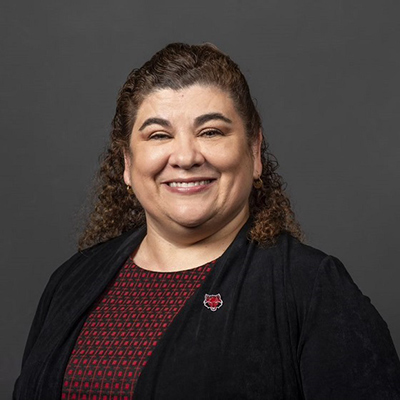Speaker Profile

Argelia Lorence, Ph.D.
James and Wanda Lee Vaughn Endowed Professor
Lead, A-State Phenomics; Co-Lead Wheat and Rice Center for Heat Resilience (WRCHR)
Arkansas State University (A-State)
The most significant contribution Dr. Argelia Lorence has made to plant sciences has been the discovery of a novel biosynthetic pathway for vitamin C that involves myo-inositol as a main precursor. Her laboratory uses the model plant Arabidopsis to better understand the role of various subcellular pools of vitamin C in plant physiology. Her ongoing research has potential applications for the development of crops with enhanced nutritional content, better growth, and improved tolerance to multiple environmental stresses. In addition to Arabidopsis, her current models of study include rice, soybean, camelina, and maize.
Dr. Lorence directs the Plant Phenomics Facility at A-State and co-leads the Wheat and Rice Center for Heat Resilience (WRCHR; http://wrchr.org/), a consortium of Nebraska-, Kansas- and Arkansas-based researchers looking for rice and wheat varieties that are tolerant to high night temperature stress, one of the main environmental challenges limiting the yield of wheat and rice, the two most important crops worldwide.
Since joining A-State in 2005, Dr. Lorence has secured over $19 million in grants from the National Science Foundation, the National Institutes of Health, and the U.S. Department of Agriculture. Her accolades include a James and Wanda Lee Vaughn Endowed Professorship at A-State, the Arthur Neish Young Investigator Award from the Phytochemical Society of North America, Distinguished Woman in Science by the Congress of the State of Morelos, the Outstanding Hispanic Achiever of the Year Award from Hispanic Community Services in Jonesboro, and the 2021 Excellence in Diversity Faculty Award from A-State.
Prior to joining A-State, Dr. Lorence was a post-doctoral research associate at Texas A&M and at Virginia Tech. Dr. Lorence received a doctorate in 1997 and a master’s degree in biotechnology in 1995 from the National Autonomous University of Mexico (UNAM). She earned a bachelor’s degree in biochemical engineering from Autonomous Metropolitan University (UAMI) in 1991.

